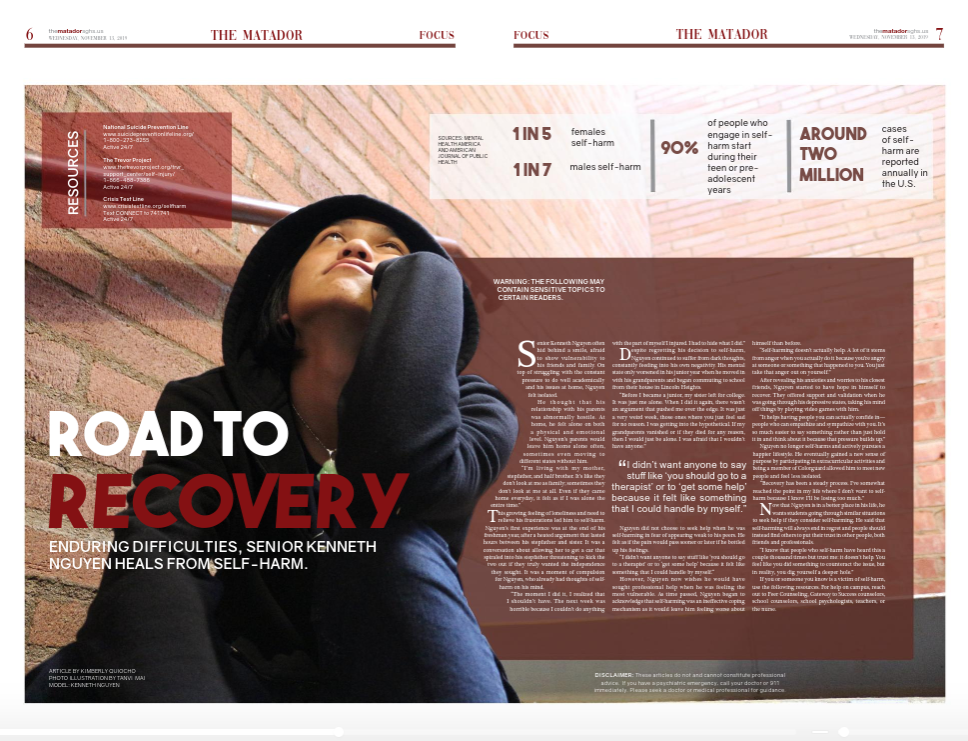
Road to Recovery
DISCLAIMER: These articles do not and cannot constitute professional advice. If you have a psychiatric emergency, call your doctor or 911 immediately. Please seek a doctor or medical professional for guidance.
Warning: The following may contain sensitive topics to certain readers.
Enduring difficulties, senior Kenneth Nguyen heals from self-harm
by Kimberly Quiocho
Senior Kenneth Nguyen often hid behind a smile, afraid to show vulnerability to his friends and family. On top of struggling with the constant pressure to do well academically and his issues at home, Nguyen felt isolated.
He thought that his relationship with his parents was abnormally hostile. At home, he felt alone on both a physical and emotional level. Nguyen’s parents would leave him home alone often, sometimes even moving to different states without him.
“I’m living with my mother, stepfather, and half brother. It’s like they don’t look at me as family; sometimes they don’t look at me at all. Even if they came home everyday, it felt as if I was alone the entire time.”
This growing feeling of loneliness and need to relieve his frustrations led him to self-harm. Nguyen’s first experience was at the end of his freshman year, after a heated argument that lasted hours between his stepfather and sister. It was a conversation about allowing her to get a car that spiraled into his stepfather threatening to kick the two out if they truly wanted the independence they sought. It was a moment of compulsion for Nguyen, who already had thoughts of self-harm on his mind.
“The moment I did it, I realized that I shouldn’t have. The next week was horrible because I couldn’t do anything with the part of myself I injured. I had to hide what I did.”
Despite regretting his decision to self-harm, Nguyen continued to suffer from dark thoughts, constantly feeding into his own negativity. His mental state only worsened in his junior year when he moved in with his grandparents and began commuting to school from their house in Lincoln Heights.
“Before I became a junior, my sister left for college. It was just me alone. When I did it again, there wasn’t an argument that pushed me over the edge. It was just a very weird week, those ones where you just feel sad for no reason. I was getting into the hypothetical. If my grandparents vanished or if they died for any reason, then I would just be alone. I was afraid that I wouldn’t have anyone.”
Nguyen did not choose to seek help when he was self-harming in fear of appearing weak to his peers. He felt as if the pain would pass sooner or later if he bottled up his feelings.
“I didn’t want anyone to say stuff like ‘you should go to a therapist’ or to ‘get some help‘ because it felt like something that I could handle by myself.”
However, Nguyen now wishes he would have sought professional help when he was feeling the most vulnerable. As time passed, Nguyen began to acknowledge that self-harming was an ineffective coping mechanism as it would leave him feeling worse about himself than before.
“Self-harming doesn’t actually help. A lot of it stems from anger when you actually do it because you’re angry at someone or something that happened to you. You just take that anger out on yourself.”
After revealing his anxieties and worries to his closest friends, Nguyen started to have hope in himself to recover. They offered support and validation when he was going through his depressive states, taking his mind off things by playing video games with him.
“It helps having people you can actually confide in— people who can empathize and sympathize with you. It’s so much easier to say something rather than just hold it in and think about it because that pressure builds up.”
Nguyen no longer self-harms and actively pursues a happier lifestyle. He eventually gained a new sense of purpose by participating in extracurricular activities and being a member of Colorguard allowed him to meet new people and feel less isolated.
“Recovery has been a steady process. I’ve somewhat reached the point in my life where I don’t want to self-harm because I know I’ll be losing too much.”
Now that Nguyen is in a better place in his life, he wants students going through similar situations to seek help if they consider self-harming. He said that self-harming will always end in regret and people should instead to put trust in other people, both friends and professionals.
“I know that people who self-harm have heard this a couple thousand times but trust me: it doesn’t help. You feel like you did something to counteract the issue, but in reality, you dig yourself a deeper hole.”
If you or someone you know is a victim of self-harm, use the following resources. For help on campus, reach out to Peer Counseling, Gateway to Success counselors, school counselors, school psychologists, teachers, or the nurse.
Statistics
- 1 IN 5 females self-harm
- 1 IN 7 males self-harm
- 90% of people who engage in self-harm start during their teen or preadolescent years
- AROUND TWO MILLION cases of self-harm are reported annually in the U.S.
Resources
National Suicide Prevention Line
www.suicidepreventionlifeline.org/
1-800-273-8255
Active 24/7
The Trevor Project
www.thetrevorproject.org/trvr_
support_center/self-injury/
1-866-488-7386
Active 24/7
Crisis Text Line
www.crisistextline.org/selfharm
Text CONNECT to 741741
Active 24/7